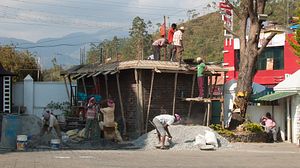On September 2, 2016, in response to a call by India’s Central Trade Union Organizations (CTUOs), workers from different sectors will participate in a nationwide strike. Termed the “Bharat Bandh 2016” (All-India Strike 2016), it will include workers across 10 states, and the numbers are expected to significantly cross the 140 million mark, which was the estimate of a strike held this same day last year. Gathering against what they call the “anti-worker and anti-people” policies of the state, the demands of those participating have been put forward in a 12-point charter. They include an increase in the minimum wage to $270 per month, an assured enhanced pension of not less than $45 per month and universal social security coverage for all workers. They have also asked for strict enforcement of basic labor laws and no unilateral amendment of the same, as well as a refusal to allow foreign direct investment in strategic sectors like railways and defense.
Prime Minister Narendra Modi chaired an emergency meeting earlier this week in an attempt to preempt the strike. The central government aimed to dissuade it by raising the minimum wage to $180 per month, and Finance Minister Arun Jaitley said he would ensure the provision of two years’ worth of bonuses to central government employees, which has been pending for a while. While the government has identified eight out of the 12 demands as strictly worker-related and states that it has been willing to bend regarding seven of them, the unions did not budge. They perceived the government’s attempts as part of a spectrum that ranged from insincere and hurried to even insulting, and decided to go ahead with the plan.
The strike will include workers from multiple prominent public sector organizations like Coal India Limited, Oil and Natural Gas Corporation (ONGC), Bharat Heavy Electricals Limited (BHEL), and Hindustan Aeronautics Limited (HAL). The broad sector count includes electricity, transportation, mining, telecom, banking (including Reserve Bank of India employees), and insurance – in varying degrees across the states. Domestic workers’ unions are increasingly joining the count, and in some states autorickshaw drivers have joined the call, with the city of Mumbai being a notable exception to this.
Although it is gaining momentum and ready to go on full steam, the strike will not impede several activities like the delivery of essential commodities like milk. Individual states and their ministers have been reacting differently, with West Bengal Chief Minister Mamata Banerjee declaring that public transport will function normally within her domain, and offices will not be permitted to shut. Private banks and ATMs will work around the country, as will several private cab services. Those employed in the Indian Railways will not be participating as the government has already constituted a committee to look into their demands for a wage increase under the 7th Pay Commission. But almost all prominent trade unions have joined this call – with the Bharatiya Mazdoor Sangh, an affiliate of prominent right-wing group Rashtriya Swayamsevak Sangh (RSS), being the only one to pull out.
The trade unions however are resolute this time. In fact, 14 prominent trade unions from across the nation have come together to form an umbrella known as the Mazdoor Adhikar Sangharsh Abhiyaan (MASA), which includes workers across sectors like cotton, automotive, agriculture, and manufacturing. They believe that the current CTUOs have largely failed the worker by not being strong enough and compromising more than they need to. In the wake of the upcoming strike, the MASA has banded and will certainly join the strike, but will also aim for stronger mobilization on the agendas of higher minimum wage, abolition of contract labor, and ending arbitrary labor law reforms. While this strike promises to be loud and vociferous this year, louder still is the resolve that underlies its spirit.

































